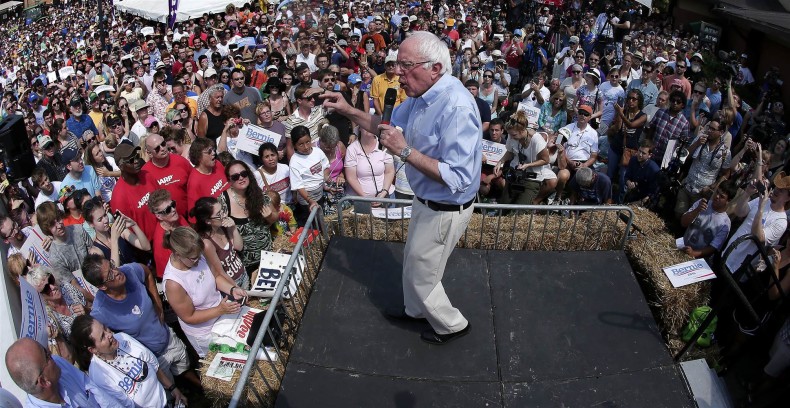How Bernie Sanders is using Reddit – and lessons on how to moderate online forums

Lessons for the UK too from how Bernie Sanders is using Reddit to fuel his most-likely-doomed-if-rather-successful-in-the-interim challenge to be the next Democrat Presidential candidate:
One of the most effective tools the Sanders operation uses to promote its attention-grabbing spectacles is a network of Bernie-loving communities on Reddit, the massive social news site. There are at least 80 distinct Sanders-related subreddits, including one dedicated to each state and the District of Columbia. In particular, the Sanders campaign is coordinating with r/SandersforPresident, which serves as the hub for an amalgam of state and local communities devoted to the cause…
The r/SandersforPresident subreddit has become both a breeding ground for collaboration and a place for the like-minded to find each other — driven, in part, by a few dedicated armchair organizers who created and oversee the community.
How they do it: R/SandersforPresident was co-created two years ago by Aidan King, a 23-year-old Vermont native with no traditional organizing experience. He and a loosely connected “inner circle” of three moderators, along with seven more dedicated to “janitorial work,” now manage the community, which has grown to nearly 100,000 subscribers. He and his co-moderators quietly channel the passions of r/SandersForPresident into event organizing, voter registration drives and tactical message delivery.
That last point is particularly important in terms of learning lessons from this: the community has people giving it a clear direction, and they are steering people towards offline action.
There’s a parallel there with the excellent work of the Liberal Democrat Newbies group who have been using the digital world, especially email and Facebook, to self-organise amongst new members, with a regular theme being jumping off into offline activities such as the very successful #LibDemPint meetups.
There’s also useful experience in how moderating has been approached by the Sanders volunteers:
Managing the Reddit community involves responding to users’ complaints while simultaneously seeking to advance Sanders’ cause. In some ways, the day-to-day management is more demanding work than getting people to events.
“Trying to keep everyone focused and happy, that’s tough,” King said…
When Sanders turned over the podium and left the stage after being interrupted by Black Lives Matter protesters during an Aug. 8 rally in Seattle, the roiling debate about the movement’s tactics spilled over into the online community, effectively drowning out any unrelated discussion.
“We needed to do something about it,” King said, “so we installed some filters and created a mega-thread.” Users were encouraged to direct their comments, pictures, videos and news links into an isolated forum. “Some people were happy, because they didn’t want to get into a fight about racial justice versus progressive politics, but a lot of people were upset and said we were censoring them.”
On this front, King, who describes himself as a “young, kind of soft-hearted, mild mannered winery employee,” is unapologetic. His reluctance to assert ownership of the community disappeared as he drilled down into the pragmatic measures he believes necessary to sustain its momentum and utility to Sanders.
“There is a hierarchy,” he said while mapping out the day-to-day negotiations between the moderators and their typically fractious liberal confederacy. “And there is a hierarchy for a reason.”
Nor is he afraid to crack the whip when the tone of the discourse strays or fades.
That sounds rather similar to my own preferred style of moderation for Liberal Democrat digital gathering, such as when I was doing the bulk of the daily moderation on Lib Dem Voice years back.
My parallel was always to think of behaving as a moderator similar to how you would behave as the chair of a public (or private, for that matter) meeting.
In particular, there is value in trying to encourage widespread participation from people in the meeting, from trying to keep discussions vaguely structured and from trying to avoid people dominating the conversation, crowding out others.
I’ve taken that approach usually when chairing Lib Dem events too. In the offline world, I struggle to think of any occasion when, for example, I’ve asked questioners to keep to the topic at hand and had a reaction of BUT THAT’S ILLIBERAL AND CENSORSHIP AND IF YOU DON’T LET ME SAY WHAT I WANT YOU’RE HEADING DOWN THE ROAD TO BEING A NAZI. Online, of course, those sort of reactions are rather more common.
One reason for that difference is that in the offline world everyone can see everyone else in the room, and so it’s instinctively more understandable and more accepted for the chair to do things that are there to serve the interests of everyone in the room even if they run slightly into conflict with the person who is talking at that immediate point in time.
In the online world, that wider audience is much easier to forget, neglect or simply not care about – especially as in most online situations it’s dominated by people who are silently reading rather than activity participating.
But just because you’re reading rather than typing and easy to ignore doesn’t mean you don’t matter or shouldn’t be considered. Especially if it’s a site or forum that aims for a wider audience rather than just a private discussion between people who already know each other well.
Leave a Reply